17 essential For Honor tips to know before you play
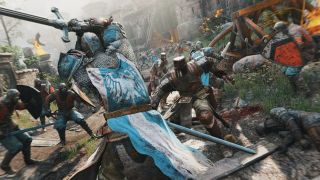
For Honor centres around medieval melee combat between warriors harking from three different martial traditions: knights, samurai, and vikings. Its core combat system has the depth of a fighting game, allowing for free-roaming duels between characters whose approach to combat varies but whose approach is always the same: hit the other guy with the pointy thing until bits fall off them. That easy-to-grasp concept is nonetheless tough to master, and regardless of how you play For Honor you'll want to master it eventually. Whether you're trying to crack single-player on the hardest setting, conquer the objective-based battlefields of Dominion mode or become a master of the duelling field, your success depends on your fluency with the basic tenets of the combat system. Improve that, and everything gets easier.
- For Honor collectibles guide - Observables and Breakables locations
- For Honor Class guide - which class should you choose?
- How to win a one-on-one duel in For Honor
- 4 secrets to winning For Honor’s 4x4 matches
Practice against AI, including single-player, will genuinely improve your skills
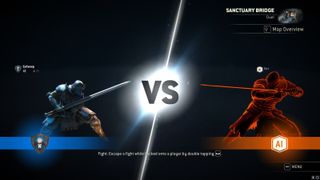
If you're new to For Honor, beginning with single-player and skirmish games against the AI really will help. Unlike many multiplayer-focused games with a single-player element, For Honor's AI is pretty smart. It knows how to block, feint, parry and grab, and it'll even taunt you from time to time. Playing through the campaign offers a structured introduction to many of the game's classes, although your objectives and the enemies you're fighting won't always directly correlate to multiplayer. You can opt to play any of the main multiplayer modes vs. AI by pressing right after selecting the mode. You'll earn XP and loot for this, get to cooperate with human teammates, and there are even orders (read: daily challenges) to be met by doing so. Play this way until you're comfortably winning all of your games.
Pick a main and get to know them…
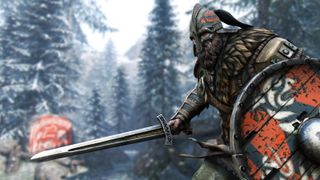
For Honor has 12 character classes at launch and they each fight in a different way. Eventually, you will need to know what they're all called, what they're good at, and what their weaknesses are. While reading through all of the moveset pages and watching all of the in-game tutorial videos makes for a solid use of a lunchbreak, it's not the most hands-on way to learn. Instead, pick a character that you like the look and feel of and play a lot of them. Picking up a deep understanding of one character will teach you a lot about how the game really works, and in learning to deal with all of the other classes you face you'll learn something about them, too. Once you've got a plan for success with your favourite character against every matchup, the decision of what to master next becomes easier: you'll know which characters fight in a way you enjoy and which don't, which are strong in the current patch and which aren't. By the time you're level 20 with your main, you'll be better at For Honor as a whole - not just the character you picked.
...but there's nothing stopping you from branching out!
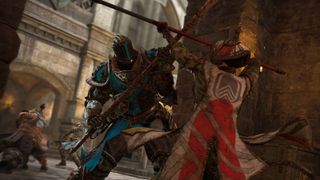
Here's a shugoki-sized 'but' - you can pick any other character at any time and jump into a game with them to see how they feel. For Honor's 'recruit' system - where you pay 500 units of steel to unlock a character - is a little misleading. None of the characters are locked by default: recruiting them simply lets you alter their look and improve their gear, which is important in certain modes. Ignore that yellow 'not recruited' sign: if you want to find out what Valkyrie plays like, you can. A good way to crack a tough matchup for your main is to step into the shoes of the character you're having trouble against. Chances are, you'll lose your first few battles or duels: which should teach you something about that character's weaknesses. And if you take to it, you'll have found yourself a solid new alternative pick.
Gear doesn't work in every multiplayer mode
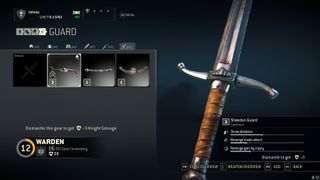
Equipping gear allows you to tweak various stats in different directions. For example, you might boost your revenge gain from blocking to allow you to activate the fight-turning revenge power more often - or extend revenge's duration, or increase the amount of damage you do after you activate it. Cooldown reduction is powerful in Skirmish and Elimination, allowing you to throw out fight-turning abilities more often. Bear in mind, however, that gear only factors into Dominion, Skirmish and Elimination modes. In Duel and Brawl, players are reset to their default stats to help with balance. You can see this by going to the settings page for any given mode and checking the 'Gear Stats' setting. In your own custom lobbies, you can enable or disable gear as you wish. The upshot of this is: if you play a lot of Duel, how you look is more important than what your gear actually does. So get fancy.
Opening packs of gear is character-specific
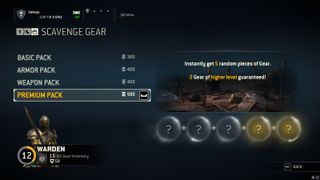
For Honor's gear pack system is a little weird. On each character's menu screen there's the option to scavenge gear, which has nothing to do with breaking down items for parts - that's handled through 'customize' - but instead is about opening packs. Some of these are bought for steel, but events and orders will often give you premium packs for free. These can contain some useful stuff. However, what they contain is determined by which character you've selected before you open them. It's up to you whether you split your boxes between characters or invest it all in your main.
You can set preferred modes in multiplayer to help with orders
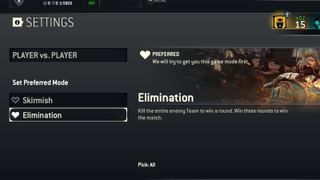
While you can always choose to queue for Dominion, Brawl and Duel, Elimination and Skirmish are bundled together under the 'deathmatch' playlist. This can be frustrating if you've got an order for kills in either of these modes, as it's actually impossible to fully guarantee which one you'll play. You can, however, set a preference by going to the settings page within the deathmatch lobby and clicking one of the big hearts next to the mode you prefer. Pro tip: pick Elimination. It's better than Skirmish, unless you're a huge fan of running around in a mob.
Don't spam side attacks when you're fighting with allies
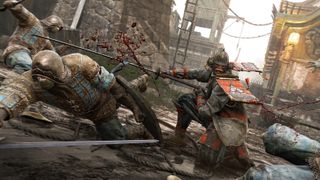
If you really are a huge fan of running around in a mob - and this applies to the other team modes too - then be careful. Friendly fire is enabled by default in For Honor, and you can and will hit your allies if you try to pile in indiscriminately. You don't do as much damage to them as you would to an enemy, but you'll interrupt grabs and executions and disrupt combos and generally make a nuisance of yourself. Just because your Raider shouts something fun when you do that big right-hand axe sweep doesn't mean that your friends want to be hit with an axe. So be careful. Sometimes the right thing to do is to let one or two allies finish a fight themselves and move on. Sometimes the right thing to do is to wait to revive them if it's going badly. If you really must get involved, overhead attacks are generally a little safer, particularly if you're playing a character who likes to swing a little wide when attacking from the side.
Stamina matters
Battles are won by reducing your opponent's health and lost by burning through all of your own stamina with nothing to show for it. An exhausted warrior attacks in slow motion and falls down at the slightest provocation. You don't want to fall down. Attacking consumes stamina, as do guard breaks, dodge rolls, and more advanced techniques like feints. Blocking is free, so working on your defensive play is often the key to shifting the balance of stamina in your favour in a one-on-one.
You're not going to out-spam an assassin
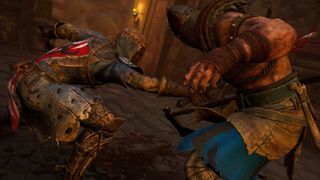
Speaking of spam: when you start playing For Honor, you're probably going to be taken down by an assassin or two. The Peacekeeper, Berserker and Orochi are all fragile but deadly in one-on-one encounters, and before you get comfortable with blocking it's easy to feel overwhelmed by the flurry of light attacks you're forced to take. And when you feel overwhelmed, the temptation might be to start swinging back. Don't. They're assassins: they will interrupt or outmanoeuvre you faster than you can hit them, no matter how much you want to hit them. Patience and blocking (and depending on your character, a bit of distance) is the key here. They hit hard but they can't take it and they run out of stamina quickly. An exhausted assassin is much easier to corner, lock down, and kill.
People are going to try to make you go in the sea/fire/spikes
You do not want to go into the sea, fire, spikes, or off that cliff, but that's sometimes where you're going to go. If you get your guard broken and you don't counter, you're at your opponent's mercy if they choose to throw you. If you're standing next to a ledge, they'll often go for the easy kill. The easiest way to stop this from happening is to avoid standing next to anything that would kill you if you fell off or into it. This means not blindly charging that guy on a rope bridge at the start of your duel, for example. Good players only fight on battlegrounds that suit them, and mastery of your main will teach you what those are.
While it's tempting to try and force your own ledge kills, the deadliest throws are often ones that cause enemies to collide with walls. These force a stagger, which will give you a free hit or two and possibly a follow-up stagger. That's how you kill people without relying on gravity to do the heavy lifting. Or heavy dropping, I guess.
Learn your guard break counters
Getting comfortable countering guard breaks will make you harder to throw off stuff, but it's one of the chancier elements of the game. Countering properly means pressing the guard break button just as your opponents' guard break connects, but before they've followed up with another input. Timing this is difficult and requires a solid read of your opponent's intent - spamming the button won't work as you have to hit the window dead-on. In general, aim to hit the button the moment your bodies connect. Guard break counters become much easier as you become comfortable anticipating your opponent's next move. If they're angling you towards a ledge or playing defensively at close range, chances are they want to guard break you. You can't see the future, but you can read intent, and if you're ready for them that counter is a lot more straightforward.
Learn to parry, too
Parrying involves blocking in the direction of your opponent's attack and then launching a heavy attack at the exact moment it connects. Do this too soon or too late and you'll get hit unless your own attack is unblockable, in which case you'll trade blows - not ideal. Do it right and you'll stagger your opponent and drain some of their stamina, which is a powerfully advantageous outcome. Crucially, parrying allows you to block attacks that are otherwise unblockable - those massive strikes with the flaming effect that cause so much trouble. Parrying an exhausted opponent will make them fall over, too. Exhausted foes won't go for attacks if they feel vulnerable, but if you're outnumbered they often will. In this scenario, a parry is a great way to create space to win - rather than just survive - an outnumbered encounter.
Also, feinting is a thing
A feint is a cancelled heavy attack that can mislead your opponent into guarding in a direction you don't plan to attack them from. To do it, press B or circle during your heavy to immediately cancel, which you can combo into another attack from a different direction - although doing this costs stamina. Some classes can't cancel, but do have other ways to reset: these are detailed on each character's moveset page.
Orochi and Nobushi are hot right now, but they can be dealt with
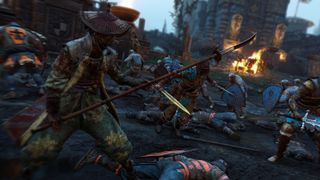
You're probably going to see a lot of these two: Orochi is For Honor's ninja, an agile samurai assassin. Nobushi are naginata-wielding warrior women who specialise in keeping enemies at (long) range and who wear excellent hats. They're popular in part because of their look and because, over the course of open beta, they emerged as very hard characters for newer players to deal with.
Nobushi specialises in playing defensively while landing jabs that combo into debilitating bleed effects. They're vulnerable if you rush them, but doing so leaves you open to a distance-creating grab-and-kick. The right approach varies based on your character, but it's important to be patient, get your blocks and parries in, and wait until they're low on stamina.
As a harassment character, Orochi are similar - though they prefer to engage at close range. Denying them guard breaks is important, and don't get caught out by their retreat-and-rush attack. Their popularity is also in part down to the usefulness of their special abilities in elimination, where a single longbow shot can end a duel with ease. There's no countering this, per se: it's just something to be aware of. If the enemy has an Orochi and they're doing well, be aware of the threat of an arrow from the flank and try to use what little cover most maps offer to your advantage.
Don't get grabbed by Shugoki
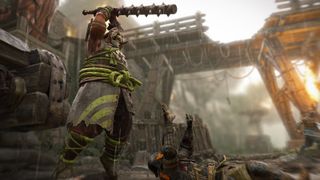
See that big guy? He can one-shot kill you. He really wants to one-shot kill you. Shugoki has a charge and grab move called Demon's Embrace where he charges you, picks you up, and breaks your back. Normally, this hurts you and heals Shugoki, although he takes bonus damage if the charge misses. However, if Shugoki is on very low health, Demon's Embrace is a guaranteed one-shot kill if it connects. On any character in the game. You've got to treat a low-health Shugoki like you'd treat any other character positioned to throw you off a ledge: whatever happens, you cannot let him land that grab. Treat him like a mini-boss in a third person shooter: let him charge, get out of the way, hit him in the bum.
Use custom matches to train
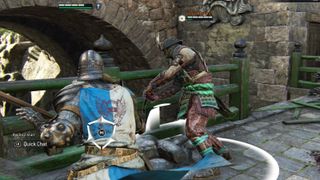
If you just want to practice or get your eye in before entering the queue, load up a custom match. You can set bots to play particular classes, choose maps, and set duels to go to 99 rounds - effectively an infinite practice mode with no loading screens. When you start taking For Honor seriously, warming up like this is better than having your rusty first match against real opponents.
There's an unspoken honor code - sort of
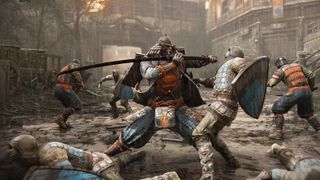
There's a deliberate irony to the name 'For Honor' - the war it depicts is notoriously short of it, from giant knights pummeling downed opponents to ninja throwing people off parapets. Yet the For Honor community maintains (and frequently breaks) a kind of code, primarily in the no-respawn modes: Duel, Brawl, and Elimination.
It's common for players to either avoid using environmental kills out of courtesy or ask their opponents at the start of a duel if these tactics are fair game. Similarly, in two-on-two brawls there's an unspoken custom about dividing the game into two distinct fights and waiting for each one-on-one to finish before the next opponent piles in. Winning your duel quick and clean is still an advantage, as it sets you up to succeed if your partner falls, but more often than not players will avoid ganging up on their lone surviving opponent.
That said, none of these rules are written anywhere and the game doesn't reward you for following them. There are plenty of players who believe that how you win doesn't matter as long as you win. There are players who revel in playing the bad guy, chucking people off cliffs and spamming emotes as they do it. This is fine - it's great, even. Part of the drama of For Honor is figuring out where you fit in its heel-face dichotomy. And when your opponents show no honor, there's no reason for you to do so either. But it's nonetheless worth being aware of the customs that do exist, just so that you don't commit a faux pas and throw a would-be new addition to your friends list into some spikes. It's always awkward when that happens.
Sign up to the GamesRadar+ Newsletter
Weekly digests, tales from the communities you love, and more

